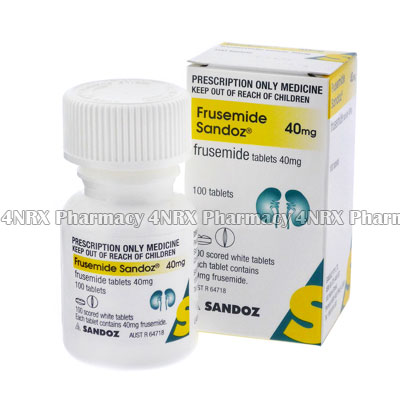 |
Home  Heart Heart  Frusemide Sandoz (Frusemide) Frusemide Sandoz (Frusemide) |
|
|||||||||
|
Frusemide Sandoz (Frusemide)
What is Frusemide Sandoz (Frusemide) used for? Frusemide Sandoz (Frusemide) is a loop diuretic prescribed to treat patients who are suffering from edema caused by heart failure, liver cirrhosis, or kidney disease. The medication prevents sodium absorption to draw excess fluids into the urine for elimination. This can prevent symptoms such as severe swelling. It also allows easier blood flow increasing circulation and reducing blood pressure making it useful for treating hypertension. This medication may be used along with other medications or to treat other conditions that are not listed here. How should I use Frusemide Sandoz (Frusemide)? Always follow your physician's instructions for using Frusemide Sandoz (Frusemide) to ensure the safest and most effective results. It is normally taken once or twice daily at the indicated dosage, but your treatment will be determined by your symptom severity, current health condition, and response to similar treatments. Do not alter any aspect of your regiment unless instructed to do so as misuse or abuse may lead to unexpected or severe health complications. When taking your daily doses, swallow the tablets whole and unaltered along with a large glass of water. It can be taken with or without food, but a snack or meal is recommended if you experience nausea after use. Do not change the form of the tablets prior to administration as this may destroy their contents or alter their effects. This includes chewing, splitting, crushing, or dissolving the contents in water. Increase your fluid intake during the day to prevent dehydration that may be caused by the effects of the medicine. You are suggested to take the doses at the same times each day to get the most efficient use by keeping a consistent level of medicine in the system at all times. Attend regular consultations with your prescribing physician to make sure the medicine is having the correct effects. After monitoring your progress and response to treatment, you may be instructed to alter the dosage or application frequency until the best results occur. Follow these directions and ask your pharmacist or physician any questions you have about the medicine to ensure the correct administration. What are the side effects of Frusemide Sandoz (Frusemide)? Side effects that may occur while using Frusemide Sandoz (Frusemide) may include the following:
More serious symptoms that may need medical attention are:
These side effects will not occur in all users and may be mild or severe. If you do experience any unusual symptoms that are persistent, intense, or worrying to you, inform your physician immediately to make sure the correct response is taken. It may be necessary to reduce your dosage or application frequency to prevent further complications from occurring. Emergency medical assistance may also be required in more serious cases. Please Note Frusemide Sandoz (Frusemide) should not be used in patients who are children under the age of eighteen, breastfeeding, or who have allergies to frusemide or amiloride, allergies to sulphonamides, have had a bad reaction to similar treatments in the past, lactose intolerance, hypovolemia, lowered or elevated potassium levels, low sodium levels, liver cirrhosis, Addison's disease, chronic dehydration, or reduced kidney function. Also inform your physician if you are elderly or have an enlarged prostate, controlled liver cirrhosis, hypotension, urinary retention, diabetes, gout, an electrolyte imbalance, low protein levels, reduced kidney function, or difficulty passing urine. These can require reduced frequency of administration, lowered doses, or other adjustments to prevent these potential problems from occurring. Strictly follow all instructions provided to you by your physician or pharmacist while using Frusemide Sandoz (Frusemide). Optimum and safe dosage can differ based on the patient and the condition being treated. As this medication may be unsafe for certain patients, it is essential you always inform your physician if you are pregnant or breastfeeding, as well as if you have any allergies, other illnesses, or ongoing health conditions, and if you are taking any other form of medication, supplements, or herbal products. Immediately seek emergency medical care if you have an allergic or hypersensitive reaction. Common signs of a reaction include hives, swelling, skin rashes, chest pains, as well as trouble breathing or swallowing. 
|
|||||||||||||||||